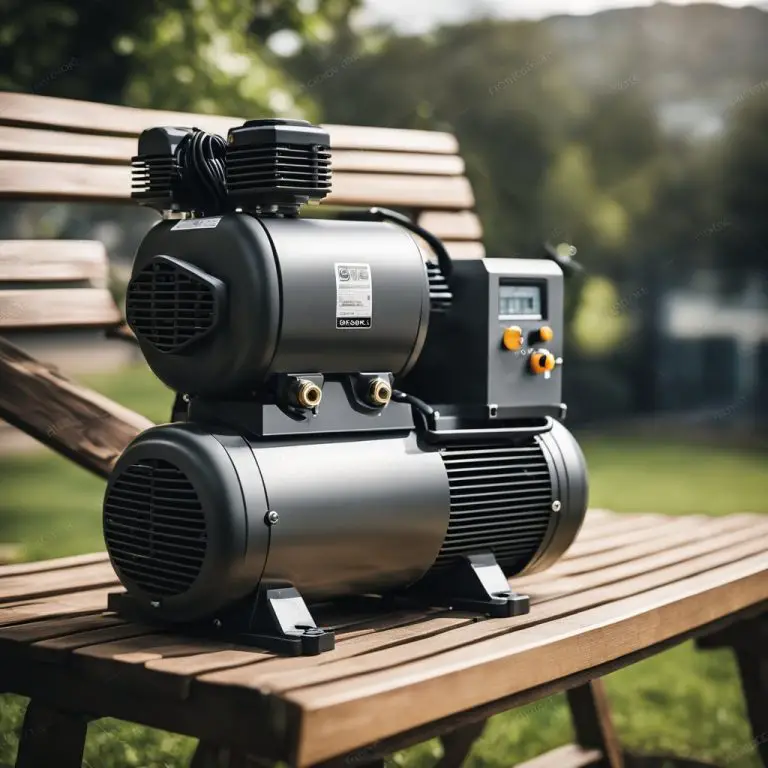Using an air compressor in cold weather can be a challenging task. The temperature drop can cause both short-term and long-term damage to the compressed air system if not handled properly. Most compressed air systems are designed to operate in temperature conditions above 40° Fahrenheit. When temperatures drop below this, the compressed air system is likely to sustain damage, leading to increased maintenance costs and reduced efficiency.
To keep an air compressor running in cold weather, certain precautions need to be taken. One of the most important steps is to warm up the compressor for at least 10 minutes before use. This will help to increase the temperature of the oil, making it less viscous and easier to circulate. Additionally, synthetic oil should be used as it has a lower pour point and can flow more easily in colder temperatures.
Another problem that arises when using an air compressor in cold weather is frozen control lines. Control lines can quickly freeze up, leading to adverse effects on system performance. This is particularly true for rotary screw air compressors. If the compressor won’t start in the winter, cold ambient temperatures are likely to blame. It is essential to take steps to prevent freezing, such as insulating the control lines or using a heater to keep the lines warm.
Understanding Air Compressors
Air compressors are mechanical devices that convert power into potential energy stored in pressurized air. They are commonly used in industries such as construction, automotive, and manufacturing. Air compressors come in various sizes and types, from small portable units to large industrial machines.
Air compressors work by drawing in air and compressing it, which increases the air pressure and reduces the volume. The compressed air is then stored in a tank or released through a hose for various applications. Some common uses of compressed air include powering tools, inflating tires, and cleaning surfaces.
When using an air compressor in cold weather, it is important to understand the temperature range of the compressor. If the temperature falls below 50 degrees Fahrenheit, the compressor may be at risk for multiple problems. Internal condensation can form and crack the air cooler, oil can thicken and cause lubrication issues, and rubber hoses and belts can lose flexibility and snap.
To prevent these issues, it is recommended to warm up the air compressor for at least 10 minutes before use and use synthetic oil. Additionally, storing the air compressor in a heated area can help avoid damage caused by freezing temperatures.
Overall, understanding the basics of air compressors and their temperature range is essential for safe and efficient use, especially in cold weather conditions.
Challenges of Using Air Compressors in Cold Weather
Using an air compressor in cold weather can be challenging due to the following factors:
Component Corrosion
Air dryers operate less efficiently in colder temperatures, which increases the chance of increased condensate throughout the compressor system. As time passes and the moisture levels continue to increase, internal components are more likely to rust and corrode. This can lead to damage and decreased performance of the air compressor system.
Drain Valve Freezing
The drain valve on a refrigerated air dryer may freeze open or shut in cold conditions. This can lead to blockage of the condensate from draining, which can cause moisture to build up and reduce the effectiveness of the dryer. To prevent this, it is important to ensure that the drain valve is properly insulated and heated.
Lower Air Pressure
Cold weather can also cause lower air pressure, which can affect the performance of the air compressor system. This is because cold air is denser than warm air, which means that the compressor has to work harder to compress the air. To compensate for this, it may be necessary to adjust the pressure settings on the air compressor system.
Frost and Water Vapor
Frost and water vapor can also be a challenge when using an air compressor in cold weather. Frost can accumulate on the air compressor system, which can cause damage and decrease performance. Water vapor can also condense in the air compressor system, which can lead to corrosion and damage.
To avoid these challenges, it is important to properly prepare and maintain the air compressor system for cold weather conditions. This may involve insulating and heating components, adjusting pressure settings, and regularly draining condensate from the system.
Preventive Measures for Using Air Compressors in Cold Weather
Air compressors are essential equipment in various industries, including automotive, construction, and manufacturing. However, cold weather can affect their performance and lifespan. To prevent damage and ensure optimal performance, it’s crucial to take preventive measures when using air compressors in cold weather.
Proper Lubrication
One of the critical preventive measures for air compressors in cold weather is proper lubrication. Cold temperatures can cause the oil to thicken, reducing its flow and lubrication properties. Therefore, it’s essential to use oil with a lower viscosity rating suitable for cold weather conditions. The manufacturer’s manual should provide guidance on the recommended oil type and viscosity.
In addition to using the right oil, it’s crucial to check the oil level regularly. Low oil levels can cause increased friction and wear, leading to premature equipment failure. Regular oil changes can also help prevent buildup of contaminants and moisture that can damage the compressor.
Regular Maintenance
Regular maintenance is another crucial preventive measure for air compressors in cold weather. It’s essential to check the compressor’s components, including the air filters, belts, and hoses, for wear and tear. Damaged components can cause the compressor to work harder, leading to increased energy consumption and decreased performance.
It’s also crucial to drain the condensate regularly to prevent moisture buildup that can cause rust and corrosion. Moisture can also freeze in the compressor, causing blockages and damage.
Proper Storage
Proper storage is also critical for air compressors in cold weather. When not in use, it’s essential to store the compressor in a dry and warm location. Moisture and cold temperatures can cause damage to the compressor’s components, reducing its lifespan.
Before storing the compressor, it’s crucial to drain the condensate and oil. It’s also essential to cover the compressor to protect it from dust and debris that can clog the components.
In conclusion, taking preventive measures can help ensure optimal performance and prolong the lifespan of air compressors in cold weather. Proper lubrication, regular maintenance, and proper storage are essential to prevent damage and ensure the compressor’s longevity.
Dealing with Air Compressor Issues in Cold Weather
When using an air compressor in cold weather, it is important to be aware of potential issues that may arise. Here are some common problems that may occur and how to troubleshoot them:
Troubleshooting Common Problems
Condensation
In colder temperatures, air compressors are more prone to condensation buildup. This can cause rust and corrosion to internal components, leading to decreased efficiency and potential damage. To prevent this issue, ensure that the air compressor is drained of excess water regularly.
Freezing
Another common issue is freezing, which can occur in the heat exchanger or drain valve. If moisture freezes inside the heat exchanger, it can create a block in the system and potentially crack the heat exchanger. The drain valve on a refrigerated air dryer may also freeze open or shut in cold conditions. To prevent this, make sure to keep the air compressor in a dry and warm place.
Reduced Performance
Cold weather can also affect the performance of air compressors. Frost, water vapor, and lower air pressure can all impact the efficiency of the system. To prevent this, use the correct air compressor oil and ensure that the operating pressure is set correctly.
Professional Repair and Assistance
If the above troubleshooting tips do not resolve the issue, it may be time to seek professional repair and assistance. A qualified technician can diagnose and repair any damage to the air compressor system. It is important to address any issues as soon as possible to prevent further damage and ensure the longevity of the system.
In conclusion, using an air compressor in cold weather requires proper maintenance and care to prevent potential issues. By troubleshooting common problems and seeking professional assistance when necessary, users can ensure optimal performance and efficiency of their air compressor system.
Advantages of Using Air Compressors in Cold Weather
Air compressors are versatile machines that can be used in a variety of applications, including in cold weather. While many people think of air compressors as being strictly for warm weather use, there are actually several advantages to using them in cold weather as well.
Increased Efficiency
One of the main advantages of using air compressors in cold weather is that they can actually be more efficient than they are in warm weather. This is because cold air is denser than warm air, which means that it contains more oxygen molecules per cubic foot. This increased oxygen density can help air compressors to produce more compressed air per unit of energy, which can save users money on their energy bills.
Reduced Moisture
Another advantage of using air compressors in cold weather is that they can help to reduce moisture in the compressed air. When air is compressed, its temperature rises, which can cause any moisture in the air to condense into liquid form. This liquid can then accumulate in the air compressor and cause damage to its internal components. However, in cold weather, the compressed air is cooler to begin with, which means that it is less likely to contain moisture in the first place.
Longer Lifespan
Finally, using air compressors in cold weather can actually help to extend their lifespan. This is because cold air is denser than warm air, which means that it contains fewer contaminants and impurities. These contaminants can cause damage to the air compressor’s internal components over time, but in cold weather, there are fewer of them present to begin with. Additionally, the cooler temperatures can help to reduce wear and tear on the air compressor’s moving parts, which can also help to extend its lifespan.
Overall, there are several advantages to using air compressors in cold weather. They can be more efficient, help to reduce moisture in the compressed air, and even extend the lifespan of the machine.
Conclusion
Using an air compressor in cold weather can be challenging, but it is possible with the right precautions. It is important to keep the compressor in a warm and dry area, and to warm it up for at least 10 minutes before use. Using synthetic oil can also help the compressor run smoothly in cold temperatures.
It is important to note that air compressors tend to run best in temperatures between 41- and 95-degrees Fahrenheit (5- to 35-degrees Celsius). Below that temperature, the compressor may not perform to its best abilities and could potentially get damaged. Therefore, it is recommended to avoid using air compressors in extremely cold temperatures.
Pressure considerations are also important when using an air compressor in cold weather. Outdoor use of an air compressor in cold weather can reduce the unit’s efficiency due to air pressure variations. For most air compressors, this reduces pressure according to the following formula: Pressure = (ambient temperature + 460) ÷ 459.
Water freezing is another concern when using an air compressor in cold weather. Water reaches its peak density at 39.2°F—meaning it expands as it gets warmer than 39.2°. But also as it cools. All that expansion and contraction can wreak havoc, breaking water hoses and water fittings. Therefore, it is important to drain any water from the compressor and hoses before storing it in cold temperatures.
Overall, using an air compressor in cold weather requires extra precautions and attention to detail. By following the guidelines outlined in this article, one can safely and effectively use an air compressor in cold weather conditions.


